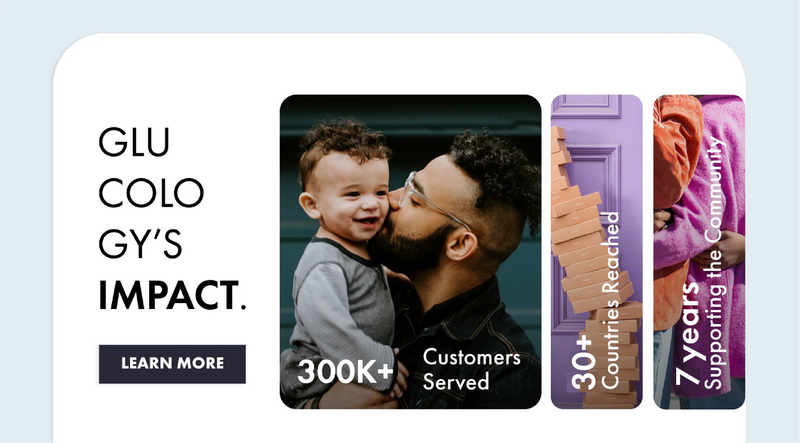No Products in the Cart

For those living with diabetes, setting thoughtful, achievable goals can be crucial for managing the condition effectively. Here are some examples of goals that may be beneficial for individuals with diabetes in the new year.
1. Improve Blood Sugar Control
Keeping blood glucose levels within target ranges is a cornerstone of diabetes management. Goals might include:
Regularly monitoring blood glucose levels.
Adjusting diet, exercise, and medications as needed to maintain target levels.
Scheduling regular A1c tests to monitor long-term blood sugar control.
2. Enhance Diet Quality
Diet plays a significant role in managing diabetes. Some dietary goals could include:
Incorporating more fruits, vegetables, whole grains, and lean proteins into meals.
Reducing intake of processed foods, sugars, and unhealthy fats.
Planning meals and snacks to ensure balanced, consistent carbohydrate intake throughout the day.
3. Increase Physical Activity
Exercise can help manage blood sugar levels and overall health. Goals might include:
Engaging in at least 150 minutes of moderate-intensity aerobic exercise per week, as recommended by the American Diabetes Association.
Incorporating strength training exercises two or more times per week.
Finding physical activities you enjoy to make exercise a sustainable habit.
4. Prioritise Mental Health
Managing diabetes can be stressful, and mental health is closely linked with physical health. Mental health goals could include:
Practicing stress management techniques such as meditation, deep breathing, or yoga.
Seeking support from a therapist, support group, or counsellor.
Setting aside time for activities that bring joy and relaxation.
5. Focus on Weight Management
For those who are overweight, losing even a small percentage of body weight can have a positive impact on diabetes management. Goals related to weight management could include:
Working with a dietitian to create a healthy, sustainable weight loss plan.
Incorporating regular physical activity into your routine.
Celebrating non-scale victories, such as improved energy levels or better-fitting clothes.
6. Prioritise Sleep Quality
Staying up-to-date on diabetes research and advancements can empower individuals to manage their condition effectively. Goals could include:
Attending diabetes education classes or workshops.
Following reputable sources for diabetes news and research.
Engaging with a healthcare team to stay informed about personalised management strategies.
7. Regular Health Check-ups
Adequate sleep is essential for overall health and can also impact blood sugar levels. Sleep-related goals could include:
Aiming for 7-9 hours of sleep per night, as recommended by the National Sleep Foundation.
Establishing a consistent sleep routine by going to bed and waking up at the same time each day.
Creating a sleep-friendly environment by keeping the bedroom cool, dark, and quiet.
Avoiding caffeine and heavy meals close to bedtime.
Implementing relaxation techniques, such as reading or listening to calming music, to wind down before sleep.
8. Build a Support Network
Managing diabetes can be challenging, and having a support network can make a big difference. Goals could include:
Joining a diabetes support group, either in-person or online.
Sharing your diabetes management journey with friends and family.
Seeking advice and support from healthcare professionals as needed.
9. Improve Medication Management
Taking medications as prescribed is a critical aspect of diabetes management. Goals might include:
Setting reminders to take medications as prescribed.
Discussing any side effects or concerns with a healthcare provider.
Regularly reviewing medications with a healthcare team to ensure they are still effective.
10. Set Personalised Goals
Everyone's diabetes journey is unique, and goals should be tailored to individual needs and circumstances. Goals could include:
Identifying specific challenges in diabetes management and developing strategies to address them.
Setting personal milestones and celebrating achievements.
Continuously re-evaluating and adjusting goals as needed.
In conclusion, setting achievable, personalized goals is crucial for individuals with diabetes in the new year. By focusing on areas such as blood sugar control, diet, exercise, mental health, weight management, and medication adherence, individuals can empower themselves to manage their condition effectively and lead a healthier, more fulfilling life.

The content of this Website or Blog is not intended to be a substitute for professional medical advice, diagnosis, or treatment. Always seek the advice of your physician or other qualified health provider with any questions you may have regarding a medical condition. Never disregard professional medical advice or delay in seeking it because of something you have read on this Website or Blog.
If you think you may have a medical emergency, call 911 (in the US) or 000 (in Australia) immediately, call your doctor, or go to the emergency room/urgent care.